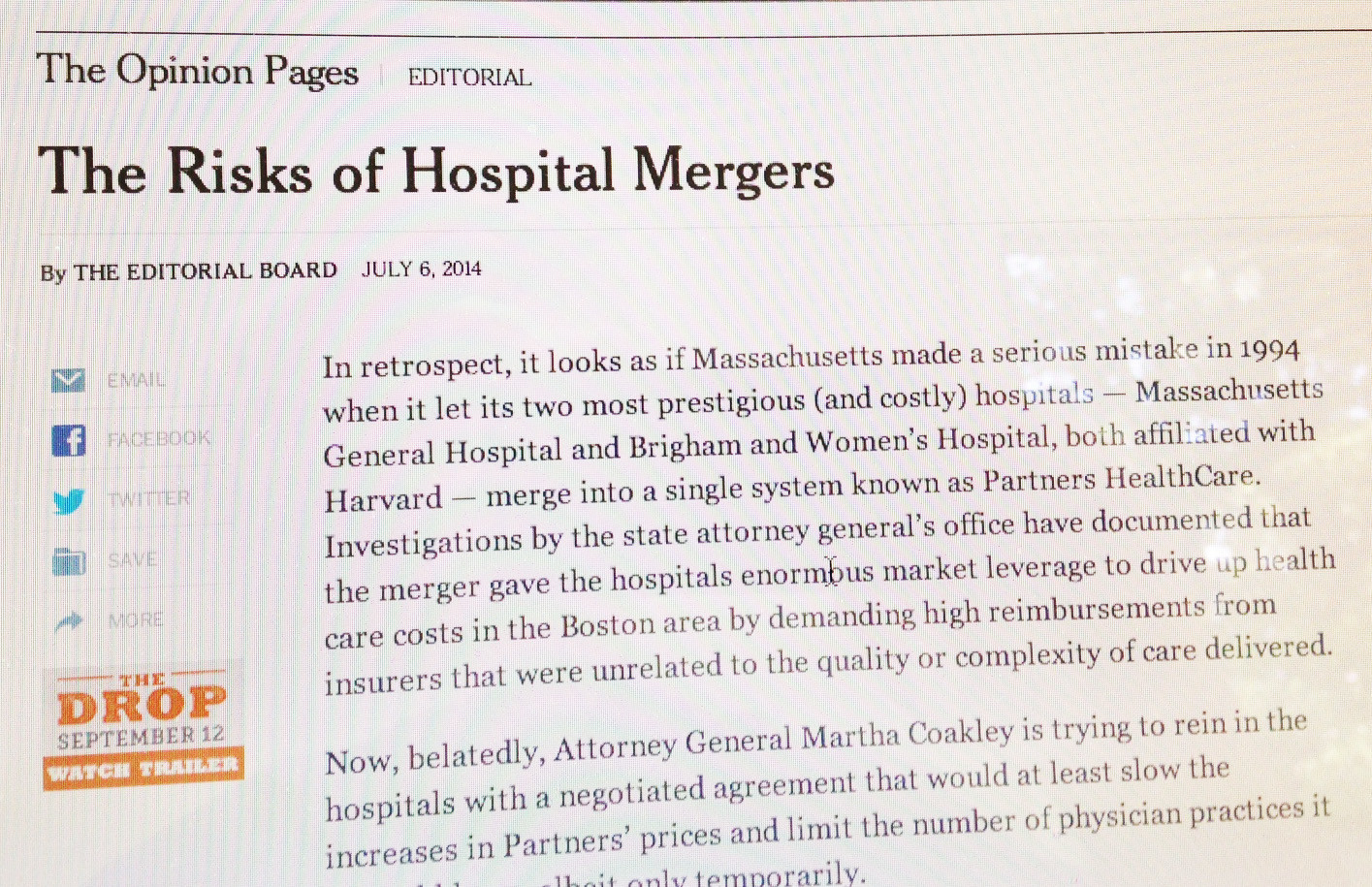Hospital mergers, cost containment and health care reform
A prescription for better policy, lower costs, and better outcomes
PROVIDENCE – Earlier this summer, The New York Times Editorial Board posted “The Risks of Hospital Mergers,” detailing the impact on health care costs from Massachusetts’ 1994 Mass General Hospital and Brigham and Women’s Hospital merger.
The merger created Partners HealthCare – which is now the largest provider system in Massachusetts. Partners had been found to exercise significant market leverage that has driven up Boston’s health care costs unrelated to quality or complexity of care delivered.
The editorial was a response to the recommendation by the Massachusetts Attorney General in a court case to allow Partners to purchase additional hospitals and physicians’ groups, giving the state’s largest hospital system even greater market share.
A cost commission, created by Massachusetts to help stem the rising costs of health care under the Massachusetts health reform effort known as “Romneycare,” found itself without any legal authority to review and weigh in on the deal.
Rhode Island has experienced its own wave of hospital mergers, ownership conversions and consolidations.
In the last two years:
• Memorial Hospital completed its merger with Care New England.
• Westerly Hospital was acquired by nonprofit Lawrence + Memorial Hospital in New London, Conn.
• Landmark Medical Center of Woonsocket was bought by the for-profit Prime Healthcare Services of California after years in court-ordered receivership.
• Prospect Medical Holdings, a for-profit California firm, acquired Chartercare Health Partners, which owns Roger Williams Medical Center and Our Lady of Fatima.
• Lifespan, the state’s largest hospital system, acquired Gateway Healthcare, a behavioral health provider, and Ob-Gyn Associates, one the region’s largest ob-gyn physicians’ groups.
South County Hospital, Rhode Island’s last remaining independent community hospital, has been actively exploring a merger with Southcoast Health System of Massachusetts.
South County Hospital officials said that one reason for looking at this merger is the infeasibility of surviving as an independent hospital in an environment of competition from large hospital systems. Another reason, according to the hospital’s CFO, is to enable robust management of population health data analytics.
Indeed, population health management through health IT systems is a critical component to determine the metrics for reimbursement in the new world of bundled payments and Accountable Care Organizations, or ACOs.
The reasons for hospital mergers are a complex blend of risks and opportunities, with their true impact yet to be determined:
• Hospitals typically experience market pressure before conversion, such as a drop in inpatient care demand and increased competition, according to a 2012 report in the Rand Journal of Economics.
• Larger systems can better leverage acquiring capital for new services and infrastructure, such as electronic medical records, which are said to encourage efficiency in care. Both Lifespan and Care New England have invested in new health IT systems, costing a combined $150 million.
• Conversion to for-profit and/or consolidation have been associated with increases in price, decreases in quality, and in some cases, fraud.
• Health reform initiatives under the Affordable Care Act are seen as fueling the consolidation trend through their emphasis on global payment and ACO models. As hospitals and services become consolidated, the capability of hospitals to offer a continuum of care for the “whole” patient for one global price is seen as a way to improve how health care dollars are spent, containing costs and utilization, while improving outcomes.
The trend in hospital consolidation has often created tense relations between insurers and hospitals, each blaming the other for the rising costs.
Here in Rhode Island, it has also prompted some positive efforts of strategic collaborations between hospital systems and insurers to launch pilot programs to move away from fee-for service.
But, as former R.I. Health Insurance Commissioner Christopher F. Koller, now president of the Milbank Memorial Fund, wrote in the Aug. 4 issue of Health Affairs: “The cost of medical care makes up 80 to 85 percent of our insurance premium. Insurers have proven pretty helpless however at influencing the underlying utilization patterns… and in concentrated markets, the prices of hospitals, physicians and other providers.”
Koller continued: “All stakeholders – regulators, providers, purchasers and the general public – would do well to stay focused on what is happening with the medical trend and what sort of reform will keep cost in check.”
Consumers end up absorbing the collateral damage from the health care system dysfunction through more limited networks and limited access to care.
To address this, states like Connecticut are seeking to develop a comprehensive approach to the review process for statewide health care planning so as to not find themselves in a changed landscape, playing catch-up, according to a March 2014 report by Connecticut Health Investigative Team.
This is essentially what HealthRIght’s proposed 2014 Health Care Authority Bill sought to create: a coordinated, transparent and publicly accountable health system.
The question remains: can these larger networks truly increase the value of care, drive down costs, improve health, and decrease utilization – without a comprehensive statewide health care plan in place?
Mergers are seemingly inevitable, and preventing them would be counterproductive.
However, Rhode Island can learn from what is happening in Massachusetts, in Connecticut and around the nation, and forge ahead.
Rhode Island has all the pieces and tools to develop an accountable health system model. And HealthRIght is well-positioned to help facilitate that process.
We invite all to join our discussion to come up with policy solutions together to achieve a more affordable, accessible, and sustainable health care system for all Rhode Islanders.
Amber Ma is a policy and research assistant at HealthRIght, and a recent MPA graduate from Brown University. Betsy Stubblefield-Loucks is the executive director of HealthRIght.






